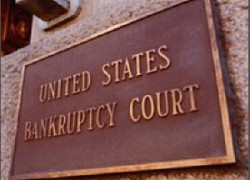

- Image by Getty Images via Daylife
OVERVIEW
When a person or company is no longer able to pay its creditors, the individual or firm usually files for bankruptcy protection. Typically, a bankruptcy filing is initiated voluntarily by the person, who will declare him/herself unable to meet his/her creditors. The most common form of bankruptcy generally protects an individual or firm’s assets from creditors.
—————-
When a person or company is no longer able to pay its creditors, the individual or firm usually files for bankruptcy protection. Typically, a bankruptcy filing is initiated voluntarily by the person, who will declare him/herself unable to meet his/her creditors. The most common form of bankruptcy generally protects an individual or firm’s assets from creditors. Sometimes, creditors will file a bankruptcy against an individual in order to try to get back some of what they are owed or to restructure the debt. Bankruptcies are always filed in the United States Bankruptcy Court, which is a federal court, but bankruptcies are subject to state laws as well.
When You File for Bankruptcy: Types of Bankruptcies
There are six different types of bankruptcies according to the Bankruptcy Code. Chapter 7 bankruptcy handles the basic liquidation of the assets of an individual or a business. Chapter 11 bankruptcy handles the reorganization of a business’s debts, and Chapter 13 bankruptcy handles the rehabilitation of an individual with a steady income. Those are the most common forms of bankruptcy declared by individuals and businesses. Up to 65% of consumer bankruptcy filings are Chapter 7 bankruptcy filings. There are strict laws and guidelines for bankruptcy filings and bankruptcy fraud. If you are considering filing for bankruptcy, be sure to seek counsel so that you understand the complexities of the issue.
When You File for Bankruptcy: Chapter 7
In a Chapter 7 bankruptcy, the debtor needs to surrender all nonexempt property and assets to the court. The court then converts those assets to cash. That cash is then used to pay the creditors at least a portion of what they’re owed. This action then discharges the debtor from being liable for the debts. Creditors are notified of the bankruptcy proceedings by the court. Once they’ve received that legal bankruptcy notification, they must stop their collection efforts for that debt.
Bankruptcies are a matter of public record. Anyone looking for bankruptcy information can easily find it. Typically, however, unless your landlord or your employer are named as creditors in the bankruptcy action, they will not discover that you’ve filed for bankruptcy. You cannot be fired from your job because you’ve filed for bankruptcy. Spouses do not have to file bankruptcy together. If only one person has debts, it is likely that the spouse will not have to file bankruptcy as well.
When You File for Bankruptcy: Seek Legal Counsel
When you are contemplating bankruptcy, be sure to first seek legal counsel. You will need assistance with debt management, and debt settlement. You will be instructed about what debts can and cannot be discharged. You’ll want to understand which assets are protected. Keep in mind that hiding assets or running up debts right before declaring bankruptcy can create serious legal problems.
When you file for bankruptcy, it has a negative connotation. But the reality is that you can recover from bankruptcy and begin to recreate a positive financial life. You should begin this process as soon as you can after the bankruptcy filing. Reestablish credit through your bank. Reaffirm your car loan. Remember that when you file for bankruptcy, you cannot do so again for eight years.

![Reblog this post [with Zemanta]](http://img.zemanta.com/reblog_e.png?x-id=c1bd9e47-5580-4e45-a2e0-19ed7758c48f)
